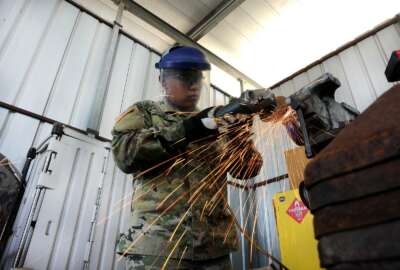How the Pentagon got gouged on spare parts prices
They say an army travels on its stomach. It also travels on spare parts. And in that regard, the Defense Department has a problem. The inspector general has found...
Best listening experience is on Chrome, Firefox or Safari. Subscribe to Federal Drive’s daily audio interviews on Apple Podcasts or PodcastOne.
They say an army travels on its stomach. It also travels on spare parts. And in that regard, the Defense Department has a problem. The inspector general has found that one spare parts supplier, a company called TransDigm, received payments that resulted in nearly $21 million in excess profits. For more, the Federal Drive with Tom Temin turned to the general counsel at the Project on Government Oversight, Scott Amey.
Interview transcript:
Tom Temin: Just review the specifics here about this case, because the numbers are pretty startling.
Scott Amey: Certainly. And well, in this case, you have TransDigm, which is a spare parts and aerospace spare parts provider. And they’ve been on the kind of at the tip of the spear for the Department of Defense IG for quite a few years, in the fact that some of their profit margins on some of their spare parts are extremely high, we’re talking in the 500%, 1,000%, even up to the nearly 4,000% higher than what it cost to actually manufacture these parts. And so there’s been some questions about TransDigm’s business model, because they come in, and a lot of times by up smaller providers that have unique contracts with the Department of Defense to supply these spare parts, and then immediately the price of these parts increases. And so there’s some real questions about TransDigm’s business model. And then these reports actually raise a lot of questions about why the Department of Defense keeps turning to them, and paying these outrageous prices. And so I think it’s kind of a perfect storm here that you want to point a finger at the contractor. But then you also need to point a finger at the Department of Defense on why do you keep entering bad deals?
Tom Temin: Yes, and that idea of profit margin doesn’t it vary depending on the price and the part. For example, if it costs you a 100th of a cent to make a pin, but you sell the pin for a penny, because you have distribution and packaging and mailing costs, then that might be a 1,000% increase, but from a 100th of a cent to a cent. Whereas if it cost you a million dollars to make a part, and you sell it for 1.2 million, then you’re only 20%.
Scott Amey: Certainly, I’ve never really worried about profit margin as much, because we’ve seen some bad deals where there was only a 5% profit margin in comparison to some other offer where there was maybe a 30% profit margin. And when you look at it, especially fixed prices, they might have just shuffled prices around. And so profit doesn’t mean that much to me. But with these profit margins, they are extremely high. And the company will say, but we charge these not only for the reasons you just stated, but also because in a lot of these instances, we haven’t produced these parts in a very long time, we have to relearn how to produce them, we have to reengineer our machinery to produce these parts. And that takes time and money and resources. And that’s why we’re so high.
But there’s got to be a way for the Department of Defense to figure this out to come to a better solution that ensures that we’re not paying such high prices. And especially because these are sole source contracts. And that’s part of the other thing is the Department of Defense in a lot of instances says they don’t have other places to go. And the claim is that these are commercial products, so at that point, all these things create a perfect storm where the government contracting officer isn’t getting really good data in that it can analyze whether the prices that it agrees to are fair and reasonable. And until the government gets access to that data, the government’s going to keep buying, you know, pin the tail on the donkey, flying with a blindfold on. And it would be like in the consumer market that you’re going in, and you’re buying a car without a sticker price, or you’re not really seeing prices on. How would you like it, if you didn’t see prices on Amazon, or eBay, or Walmart or any other places on the internet? You don’t get to see prices. And then those vendors come back to you and say well go other places and see if what you can find and determine whether our named price is kind of fair and reasonable. And so it’s really putting the government in a really bad position as a buyer.
Tom Temin: We’re speaking with Scott Amey, he is general counsel at the Project on Government Oversight. And when they produce and plan and buy weapons platforms and so forth, there’s always the life cycle costing that goes into the military planning. And that takes into account the cost of replacing engines down the line. But we’re talking about mundane types of nuts and bolts sort of parts. Is that the issue here?
Scott Amey: Oh, certainly. That’s exactly what the issue is. And for many years, everybody’s been worried about spare parts. In the old days, POGO made its living off of spare parts, and that was the coffee pot, the toilet seats and the hammer. I mean, the government and especially the Department of Defense have never been really good buyers of these. You’re absolutely right. It’s screws, it’s bolts and nuts and all different things that go into these with huge markups and much higher and especially with them labeled as commercial as some of these you can go into a hardware store and buy and you’re like, well, why are we buying this screw or nut that costs five cents over at the local hardware store at the box store? And then why is the federal government spending $80 on it?
Tom Temin: Yes, I recall many years ago someone I knew that owned an airplane and it needed piston rings. He said I could go and buy the same piston ring for my car and it would be 10 bucks but because because it has an FAA stamp on it, the same piston ring is 100 bucks, because it’s going in an airplane and presumably, maybe it meets different specs. But if that’s not the case, where is the Defense Logistics Agency and some of the oversight structures like the Defense Contract Audit Agency and so forth that, presumably look at these kinds of things routinely?
Scott Amey: Well, they should. And I think a lot of these, pardon the pun, but a lot of these spare parts fly under the radar. They’re small procurements on their first small quantity. And so that’s actually how TransDigm, and it’s just not TransDigm, I mean, we’ve seen spare parts horror stories and IG reports that date back, you know, 20-30 years, even in the most recent report that the IG did about TransDigm, they talk about other reports that are 23 years old in which the Department of Defense didn’t do a very good job. But it’s also the access to information. And so the federal government doesn’t have the best access, like they have a list of things that the contracting officers should do to check off to try to determine whether the prices and costs are fair and reasonable. Well guess what last on the list is? Like eighth or ninth down on the list is ask the contractor for price or costing data. And so a lot of times the contractor isn’t providing that information to the government, the government is having to do market research, previous prices paid, they’re having to look at other vendors and what they provide these goods or services to the government for.
So the last thing is, now if we were consumers, and you had to do all this other pricing data without going right to the direct vendor and say, OK, how much do these shoes cost? We would never do it. And so it really does put the government in a bad situation. And so the government doesn’t have the best information when it buys these products or services.
Now, TransDigm, if you watch the hearing a few weeks ago, they’ll say, but these are our commercial prices, and we’re even giving the federal government the Department of Defense discount. But the question is, can we buy more in bulk? Can we merge these together? If you know that you’re going to need this order over the next two or three years, instead of buying it in quantities of 13 or 15? Can we buy 100 of them, because you know you’re going to sit on them. And the other thing I think is the federal government needs to find a way to get out of the sole source deals and have some kind of multiple word procurement, that there are other vendors that we can turn to to produce these spare parts and try to get them cheaper and allow competition to take over. I mean, there’s a lot of key terms here that sound really good for the taxpayer. It’s commercial market forces are driving it, you got a discount. But at the end of the day, the IG’s report from, I think it was about three years ago, showed that TransDigm overcharged or had excessive profits, about $16 million, and this one comes out the most recent report from December comes out and says the number was closer to $21 million, and are asking for refunds. Now three years ago, TransDigm provided a refund of that money, it will be interesting to see if they follow that path and provide a $21 million or $20.8 million refund today.
We’re in a situation where contractors are taking advantage of systems. I mean, we have systems where this data doesn’t have to be provided to the government. These contracts are under thresholds where certified cost or pricing data needs to be turned over, where that’s where you really can get in and see exactly. They’ve certified what this actually costs, the government can see that and we can buy smarter. Unfortunately, these are mostly under that radar. And we’re not seeing that type of information. So the government is really kind of buying with a question mark behind it.
Tom Temin: Because often you can find similar looking things that might be made in China or Thailand or Vietnam. And they’re not really the same grade. Is it fair to say that at least with TransDigm, there is accountability for the quality and provenance of the part?
Scott Amey: Certainly, and there’s been a big effort even with the Trump administration, and now with the Biden administration to buy American. So I don’t have a problem with that. We just need more people at the table that makes sure that we’re getting fair and reasonable prices. Because if TransDigm is saying, well, we’re giving you a discount, and this is a discount off of our market rate that we’re selling to Boeing and Lockheed, and Airbus and the other aerospace contractors out there. That sounds like we’re getting a really decent deal. But at the end of the day, we’re still overpaying on a lot of these things that we need to come to a better solution.
Tom Temin: Yeah. So it sounds like maybe then there must be some link between the supply base for these parts. And some SBA program somewhere that helps get startups going for technical and manufacturing industries.
Scott Amey: Startups, and I think there’s a call there was a lot of talk, especially by the DoD procurement official during the hearing about reverse engineering some of these parts. Is there a way we can reverse engineer it? And there’s all kinds of questions about proprietary-ness of these spare parts and the data rights of these spare parts. And you end up in a legal jungle on who owns what here, but at the end of the day, are there other ways that we can produce these? I mean, a few years ago, I believe the Department of Defense was looking at buying a toilet seat cover again, and it was going to cost an outrageous amount of money. I forget what the total was, but it was 10s of 1000s of dollars. And they were able to reverse engineer it. I think they 3D printed it for like pennies on the dollar. And so at the end of the day, the government came up with a better solution. And so I think that’s what we need to do in these instances as well.
Tom Temin: Scott Amey is General Counsel at the Project on Government Oversight. Thanks so much.
Scott Amey: Oh, thank you, Tom. You have a great day.
Copyright © 2025 Federal News Network. All rights reserved. This website is not intended for users located within the European Economic Area.
Tom Temin is host of the Federal Drive and has been providing insight on federal technology and management issues for more than 30 years.
Follow @tteminWFED






